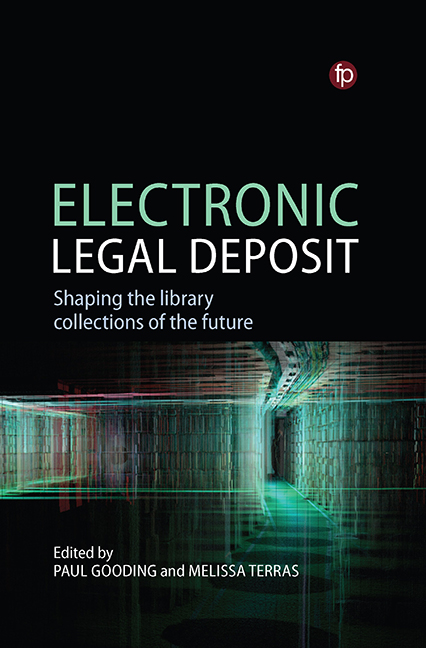Book contents
- Frontmatter
- Dedication
- Contents
- Figures and Tables
- Contributors
- Foreword
- Introduction
- PART 1 INSTITUTIONS AND IMPLEMENTATION
- 1 UK Non-Print Legal Deposit: From Regulations to Review
- 2 The Influence of Legal Deposit Legislation on the Digital Collections of the National Library Of Scotland
- 3 E-legal Deposit at the Biblioteca Nacional de México (National Library of Mexico)
- 4 Bibliographic Control in Zimbabwe: the Conundrum of Legal Deposit in the age of Digital Technologies
- 5 Electronic Legal Deposit in Sweden: the Evolution of Digital Publications and Legislative Systems
- PART 2 USERS AND CONTEXTS
- 6 Publishers, Legal Deposit and the Changing Publishing Environment
- 7 Making History: Digital Preservation and Electronic Legal Deposit in the Second Quarter of the 21st Century
- 8 Giving with one Click, Taking with the Other: Electronic Legal Deposit, Web Archives and Researcher Access
- 9 Follow the Users: Assessing UK non-print Legal Deposit within the Academic Discovery Environment
- 10 ‘An Ark to Save Learning from Deluge’? Reconceptualising Legal Deposit After the Digital Turn
- Index
Introduction
Published online by Cambridge University Press: 07 November 2020
- Frontmatter
- Dedication
- Contents
- Figures and Tables
- Contributors
- Foreword
- Introduction
- PART 1 INSTITUTIONS AND IMPLEMENTATION
- 1 UK Non-Print Legal Deposit: From Regulations to Review
- 2 The Influence of Legal Deposit Legislation on the Digital Collections of the National Library Of Scotland
- 3 E-legal Deposit at the Biblioteca Nacional de México (National Library of Mexico)
- 4 Bibliographic Control in Zimbabwe: the Conundrum of Legal Deposit in the age of Digital Technologies
- 5 Electronic Legal Deposit in Sweden: the Evolution of Digital Publications and Legislative Systems
- PART 2 USERS AND CONTEXTS
- 6 Publishers, Legal Deposit and the Changing Publishing Environment
- 7 Making History: Digital Preservation and Electronic Legal Deposit in the Second Quarter of the 21st Century
- 8 Giving with one Click, Taking with the Other: Electronic Legal Deposit, Web Archives and Researcher Access
- 9 Follow the Users: Assessing UK non-print Legal Deposit within the Academic Discovery Environment
- 10 ‘An Ark to Save Learning from Deluge’? Reconceptualising Legal Deposit After the Digital Turn
- Index
Summary
In the paper world legal deposit and preservation of printed heritage are almost synonymous with libraries. In the digital world it is not a matter of course that libraries are best suited to perform these tasks.
(Larsen, 2005, 86)Do libraries still belong at the heart of access to our digital heritage? This might seem a strange place to start a volume on electronic legal deposit, but Larsen's provocation remains relevant to our current cultural moment. For centuries, our national and research libraries have been trusted repositories of print production and culture. In terms of comprehensiveness, expertise, and accessibility, their collections were rightly viewed as world-leading. In 2005, the same year that Larsen raised the prospect that libraries could no longer be presumed to occupy that position, the Alexandria Manifesto on
Libraries summed up a more aspirational objective for libraries: Libraries and information services contribute to the sound operation of the inclusive information society. They enable intellectual freedom by providing access to information, ideas and works of imagination in any medium and regardless of frontiers.
(Australian Library Journal, 2005)In the past, libraries were undoubted technological innovators, designers of organisational improvements such as card catalogues and complex classification systems. Contemporary libraries are still spaces for innovation, but budget cuts and the growth of networked communications mean that the technological cutting edge has moved elsewhere. Karen Coyle points out that ‘if we look … at the timeline of information technology over the 20th Century and into the 21st, we see library technology falling behind the general technology evolution’ (Coyle, 2017). Rather than looking towards libraries as their first source for information, individuals now look towards Google or Facebook. Their information-seeking expectations are formed elsewhere, and they increasingly require access for reading on their own devices and in remote locations. Commonly, individuals also want portable data, and the ability to access textual corpora and metadata. And yet the main mode for accessing modern legal deposit materials in a legal deposit library setting is via what Georgi Alexandrov terms ‘e-reading’ (Alexandrov, 2018, 137): access to a single volume via a terminal within library reading rooms, for the sole purpose of reading. The dynamic process of change surrounding late 20thcentury communications technology stands in stark contrast to the print-era logic of e-legal deposit regulations.
- Type
- Chapter
- Information
- Electronic Legal DepositShaping the Library Collections of the Future, pp. xxiii - xxxPublisher: FacetPrint publication year: 2019



